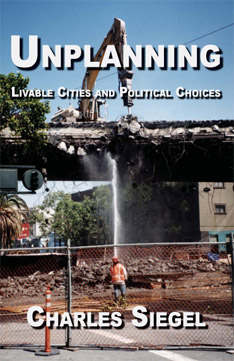
Preview the book
Buy the book
Read the book in HTML format
Print or read the book in PDF format
Unplanning is a wonderful read! It is beautifully written, it takes up extremely important and timely topics, and it offers a new and concrete approach to democracy and sustainability. I enjoy going back almost at random to read and re-read pages and passages from it. It’s very engaging and stimulating - and it should be read by every environmentalist.”- Prof. Charles Derber, author of Greed to Green
"A wonderful little book.... I recommend this book to every planner and every person interested in the future of American cities."
- Prof.Nikos Salingaros, author of A Theory of Architecture
Planning or Political Choice?
The conventional wisdom says that we need strict planning to build walkable neighborhoods around transit stations – even though these neighborhoods are like the streetcar suburbs that were common in America before anyone heard of city planning.
Yet many of our greatest successes in urban design occurred when we treated the issues as political questions – not as technical problems that the planners should solve for us. The anti-freeway movement of the 1960s and 1970s and the anti-sprawl movement of recent decades were both political movements, and citizen-activists often had to work against projects that planners proposed and approved.
This book uses an intriguing thought experiment to show that, in order to build livable cities, we should go further than the anti-freeway and anti-sprawl movements by putting direct political limits on urban growth.
Political choices about how we want to live can transform our cities more effectively than planning.
Chapter 1: Planning or Politics The Failures of Planning
Reducing the Need for Planning
Chapter 2: The Technocratic Ideal
Functionalism and Technocracy
International Style Planning
Garden City and Regional Planning
Project and Accommodate
Chapter 3: Postwar American Planning
Planning for Congestion
Planning for Sprawl
Planning for Blight
Planning Functionally
Comprehensive Regional Planning
Chapter 4: Neo-Traditional Planning
Resistance Against Modernism
The New Urbanism
Smart Growth
Chapter 5: Limits on Urban Growth
Limiting Scale
Limiting Speed
Political Limits or Planning
Chapter 6: The Next Steps
Stopping Freeways
Controlling Sprawl
Zoning Choice
Controlling Speed
Transforming our Cities
Chapter 7: The End of Modernism
Modernism in Its Dotage
Technical Questions and Human Questions
The Failure of Growth
Citizens or Clients
Notes